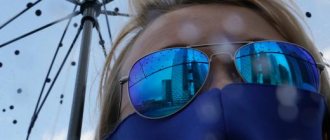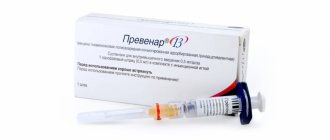When sending their child to kindergarten, parents worry about how he will be able to adapt to society, although he is still growing up, establish contact with teachers and other children, and also resist all kinds of infections. At such a tender age, a child’s immune system can encounter all sorts of diseases, and it is important to promptly help it effectively fight them.
Thus, among others, hemophilus influenzae infection poses a potential threat to the child’s body. To protect against it, the Act-HIB vaccine is used. The purpose of vaccination is to create the desired reaction to Haemophilus influenzae from the immune system. Today, these preventive measures are widely used throughout the world.
What is the danger of Hib infection?
This infection is one of the types of Haemophilus influenzae. Being an acute infectious disease, hemophilus influenzae infection negatively affects the child's body.
Where and how can you get infected?
- a baby can catch an infection in any place where there are many children, including in a nursery or kindergarten.
- If it is necessary to regularly fight chronic diseases, the child’s body is more susceptible to infection. A weakened immune system simply cannot resist a powerful infection. Therefore, the Act-HIB vaccination is especially relevant for children with heart disease, diabetes mellitus and lung disease.
- Children under 5 years of age can become infected from older brothers and sisters - schoolchildren, who themselves are resistant to infection, but can be carriers of the bacillus. So, if there are children of different ages in the family, it is necessary to vaccinate the children.
- with artificial feeding, the immune defense of the child’s body is significantly reduced. And this is another case in which vaccination with Act-HIB is indicated.
Contraindications for use
It is not always possible to use the Act-HIB vaccination composition.
Contraindications for which vaccination is strictly prohibited include:
- allergic reaction to vaccine components;
- acute course of infectious diseases;
- high temperature.
To exclude the procedure from being carried out in the presence of a condition that is a contraindication to vaccination, the doctor must conduct a preliminary examination of the patient.
Possible consequences of hemophilus influenzae infection
If the main consequence of Hib infection in other countries is meningitis, then Russian children may also face other serious complications - pneumonia, bronchitis and other respiratory diseases.
According to available statistics, Hib infection provokes about 20% of otitis media, 25% of all cases of pneumonia and over 50% of meningitis in children under five years of age. The relevance of the Act-HIB vaccine is confirmed by the high risk of infection: up to 40% of children in kindergarten are carriers of an infectious disease transmitted by airborne droplets.
Do not delay vaccination when you are planning to send your baby to kindergarten. It is until the age of 5 that he needs the greatest protection from Hib infection.
What diseases are caused by infection?
acute respiratory infections
Most often it occurs as a standard acute respiratory infection. Only special studies will help the doctor determine the infection in this case. The situation is complicated by the fact that examinations of a small patient to detect the causative agent of acute respiratory infections are carried out very rarely.
Otitis
If otitis is caused by Haemophilus influenzae, prepare for the fact that it will be quite difficult to cure.
Inflammation of the epiglottis
A disease that is usually found in children between 2 and 5 years of age and is accompanied by a sharp increase in temperature, sore throat and difficulty swallowing. In this case, urgent medical attention is required, as there is a risk of blockage of the windpipe.
Meningitis (inflammatory process in the meninges)
It is most dangerous for babies from 6 to 12 months, since it is difficult to get rid of it, and the body’s own defenses have not yet been formed to successfully fight the disease.
Composition and pharmacological action of the Act-HIB vaccine
The Act-HIB vaccine contains two main components: Haemophilus influenzae type b polysaccharide and conjugated tetanus protein . The medicine also contains excipients: trometamol and sucrose.
The main dose of the vaccine is produced in the form of a homogeneous white lyophilisate. To dissolve it, use a 0.4% sodium chloride solution, which is also present in the kit. The medicinal product does not contain living organisms that can cause the development of the disease.
Act-HIB vaccine
The vaccine contains only polysaccharides that are similar in structure to pathogenic microbes. Therefore, after the drug is introduced into the body, the disease does not develop. After entering the body, the vaccine composition causes a persistent specific reaction of the immune system to hemophilus influenzae type b infection.
This type of vaccine does not produce an immune response to other types of pathogens. Therefore, if you need to be vaccinated against other diseases at the same time, be sure to consult your doctor before undergoing the procedure.
Which children can receive the Act-HIB vaccine?
Before vaccination, it is important to determine how relevant contraindications to the use of the drug are for your child.
If intolerance to tetanus toxoid is detected, vaccination is postponed. Vaccination is not recommended for children if they have aggravated chronic diseases. 3-4 weeks should pass from the beginning of remission, then you can get vaccinated. If there are mild respiratory and intestinal infections, vaccination should be carried out after the temperature has returned to normal. According to research results, vaccine intolerance was found in only 7% of children.
Act-HIB vaccination is an effective method of combating Haemophilus influenzae b-type, which is recognized in developed countries. Because of this, you can use it to protect your baby from serious infection.
Price and analogues of conjugate vaccine
The cost of the Act-HIB vaccine is about 400 rubles. However, this indicator may not correspond to this figure in different pharmacies and regions of the Russian Federation.
If for any reason it was not possible to purchase Act-HIB, you can always use analogues of the drug. Synonyms of the drug include names of vaccine solutions such as Kimi-Hib and Hiberix. To ensure that a similar drug does not cause complications, the choice of a substitute should be made by a doctor.
Self-use of the injection composition may be fraught with consequences.
Effectiveness of vaccination
In 2000, before the widespread introduction of Hib vaccine in resource-limited countries, Hib disease accounted for 8.13 million cases of serious illness in children aged 1–59 months (range, 7.33–13.2 million cases). ) and 371,000 deaths (fluctuation amplitude – 247,000=527,000). By 2008, when 136 WHO Member States introduced the Haemophilus influenzae vaccine, there were an estimated 203 000 deaths due to Hib infection in children under 60 months of age (range 136 000–281 000).
The effectiveness of Hib vaccines is 95-100%; the protective antibody titer lasts for at least 4 years.
Among vaccinated people in 10 European countries, Israel and Australia, Hib infection developed with a frequency of only 2 cases per 1 million; 18% of these children had problems, including prematurity; 33% had low immunoglobulin levels.
List of sources
- Ilyina S.V. Hemophilic infection: textbook. allowance / S.V. Ilyina, V.T. V.T. Kiklevich // GBOU VPO IGMU Ministry of Health. – Irkutsk: IGMU, 2013. – 61 p.
- Pakhomov D.V., Snegova N.F., Kostinov M.P. Vaccination of Haemophilus influenzae b infection in children from HIV-infected mothers and in HIV-infected children // Children's infections. – 2005. – T. 4 – No. 2. – P. 60–64.
- Sepsis caused by H. Influenzae/ Rossina A.L., Chuelov S.B., Korsunsky A.A. and others//Children's infections. – 2021. – T. 17, No. 2.
- Kharchenko G.A., Kimirilova O.G. Hemophilus influenzae infection in children with sporadic morbidity: clinical cases with different (favorable or fatal) outcomes. Issues of modern pediatrics. 2017; 16(3): 241-245.
Tests and diagnostics
In the diagnostic process, the doctor takes into account a number of factors that contribute to infection with Haemophilus influenzae, as well as the age of the patient. An examination and interview is carried out to determine clinical manifestations.
To confirm infection with Haemophilus influenzae, laboratory testing of samples of blood, pus, sputum, cerebrospinal fluid, and mucosal smears is carried out.
In the process of determining hemophilus influenzae infection, the following laboratory diagnostic methods are used:
- bacteriological culture, bacterioscopy;
- serological diagnostics;
- enzyme immunoassays;
- PCR.
A number of other studies are also being conducted.
- General and biochemical blood tests are performed.
- To determine sensitivity to antibiotics, an antibiogram is performed.
- of epiglottitis appear, laryngoscopy is practiced to determine the condition of the respiratory tract.
- To determine the condition of the lungs, a chest x-ray or CT scan of the lungs is performed.
- If there are signs of meningitis, a lumbar puncture is performed.
Sometimes it is advisable to conduct other studies.
Diet
Diet 13 table
- Efficacy: therapeutic effect after 4 days
- Time frame: no more than 2 weeks
- Cost of products: 1500-1600 rubles per week
For hemophilus influenzae infection, it is recommended to adhere to the principles of the “Table No. 13” diet.
The diet should include the following products:
- Low-fat soups with fish and meat, soups with cereals.
- Wheat crackers.
- Poultry, veal.
- Fish.
- Eggs.
- Lactic acid products.
- Porridge from buckwheat, rice, semolina.
- Vegetables fruits.
- Honey, jams, marmalade, marshmallows.
The following foods should not be consumed:
- Fatty broths, soups, borscht.
- Fresh baked goods, muffins.
- Fat meat.
- Sausages, semi-finished products.
- Milk, sour cream.
- Cabbage, radishes, onions, garlic.
- Mushrooms, legumes.
- Spices, smoked meats.
- Confectionery.
- Alcohol.
- Strong coffee.
Consequences and complications
Severe pathologies can develop as complications of hemophilus influenzae infection:
- Cerebral edema may develop as a result of meningitis .
- In patients with acute pneumonia, acute respiratory failure is possible.
- If the disease occurs in the form of epiglottitis , respiratory failure may develop with a potentially fatal outcome.
- Septic shock may also develop .
- In addition, long-term consequences of the disease can be otitis media , sinusitis , hearing problems, blindness , and osteomyelitis .
Chance of getting sick
There are several risk groups for this disease. Firstly, children most often suffer from this infection. According to various studies, carriage of Haemophilus influenzae in children reaches 50%. Infants 6-12 months of age who are bottle-fed and do not receive small additional amounts of maternal antibodies in breast milk have a particularly high risk of developing the most severe forms of infection - pneumonia and meningitis. For this reason, artificial feeding is an additional indication for vaccination against Hib infection, starting from 3 months of age.
People of extreme ages (children under 2 years of age, the elderly) and people with low socioeconomic status are also susceptible to hemophilus influenzae infection. In addition, people with low socio-economic status, extremely weakened and suffering from alcoholism, patients with lymphogranulomatosis (Hodgkin's disease), sickle cell anemia are susceptible to the disease; persons who have undergone splenectomy (removal of the spleen).
The incidence increases in late winter and spring. In recent years, the incidence of morbidity in adults has increased markedly.
Benefits of immunization in our clinics
High-quality vaccines
Vaccination against hemophilus influenzae in children is carried out with certified drugs that are absolutely safe for health: combined vaccines Pentaxim, Infanrix Hexxa, French conjugate vaccine Act-HIB, Belgian Hiberix.
High-quality prophylactic drugs do not undermine immunity or reduce the effectiveness of other vaccines, which allows them to be administered along with other vaccines. Combination drugs can prevent other infectious diseases (hepatitis B, mumps, meningitis, tetanus) in a timely manner.
Experienced staff
All NEARMEDIC specialists have undergone special training and have certificates confirming their qualifications. If parents are concerned about an allergy to the drug, you can consult an allergist-immunologist with us. After vaccination, the child is observed by a doctor for half an hour.
Features of vaccination against hemophilus influenzae infection
Since 2011, vaccination against Hib infection has been included in the National Immunization Calendar.









